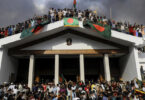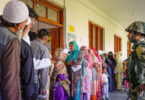By Zafar Ullah
On the night between 9th and 10th of April, Former Prime Minister of Pakistan Imran Khan was ousted by a vote of no confidence in the parliament with 174 members voting against him, making him the first PM in Pakistan’s history to be shown the door in this manner. The motion was supported by all the opposition parties and factions and it took a month to materialize due to the delay tactics employed by Khan which culminated in the dramatic events of the last four days of his government. The Speaker of the National Assembly cancelled the motion by calling it an “American Conspiracy”. Finally, an “intervention” from the Supreme Court concluded the matter albeit belatedly.
These extraordinary events are a reflection of the extraordinary political, social and economic crisis of the State of Pakistan. They show that the State and the Ruling classes of Pakistan are rife with profound contradictions, chaos and factionalism and they have bitter conflicts over the foreign policy, economic interests and the loot. Unlike the relative unity of the modern nation states, ours is one with belligerent and strong factions of the state and the political elite.
For many years, the military establishment propped up Imran Khan as a fresh face in politics. For them, a “Corruption Free”, honest and popular political leadership was necessary as an alternate for the two main parties taking turns in power. Instead of direct military rule, a “Hybrid Regime” was in the making for over two decades, and accelerated by various political events and materialized in 2018. The assassination of Benazir Bhutto in 2007 was one of those events. It was the beginning of the end of PPP’s support base amongst the working and middle classes. This was intensified by the extremely anti people policies of the Peoples Party’s regime of 2008, including the worst power cuts and inflation. In societies like Pakistan, individuals in the traditional parties become the centers of hopes and aspirations of the masses. The role of individual dominates the party. Hence, the political and social basis of PPP stems from the revolutionary measures taken by Zulfiqar Ali Bhutto resulting from the mass movement of 1968-69. But subsequently PPP’s failures and degeneration intensified. In this political vacuum some layers of the working and middle classes, particularly the urban white collar middle class started moving towards Imran Khan’s PTI (Pakistan Tehreek-e-Insaf) culminating in the mass rally in Lahore on 30th October 2011 as its political expression. This was a surprise for Imran Khan too. It was only possible due to the absence of a left alternative with mass basis. The rise of Imran Khan was an expression of years of pent-up dysphoria, unrest and impatience of the urban middle classes (specially the youth) and the upstarts. Imran Khan was a reflection of their ideologies, thoughts and attitudes stemming from their social conditions.
From the beginning the Imran Khan’s government was backed by the military establishment. It was a relatively popular right-wing government fighting against the traditional right-wing party. Hiding behind this veneer, the state used the pretext of “Hybrid Warfare” and “Fifth Generation Warfare” to crush all criticism of them. There was a complete media censorship. Suppression and abductions were commonplace. Imran Khan with the backing of the state acted like a dictator and humiliated and oppressed all opposition. As a result many layers of the masses, specially in Punjab started raising their voices against the “State Institutions”. This rang alarm bells. The military had to distance itself from a government rapidly losing its popularity, in order to uphold their Image.
In order to analyse Imran Khan’s character, we need to employ the Marxist theory of the role of individual in history. There are times when the role of an individual becomes decisive. Trotsky has extensively written about it in the “History of Russian Revolution” and “Stalin” and explained that historical tendencies and events accumulate in the character of a single individual. One such individual is Imran Khan. The combination of his ego, narcissism, stubbornness, reactionary and dictatorial attitude resulted in unprecedented and long term negative and ugly effects on the society. But he is also a personal expression of a social process. These attributes are the reflections of the classes which he represents.
The recent events and the no confidence motion are objective expressions of the conflicts and contradictions within and between state institutions, which came to fore when the Chief of Army removed the head of the powerful intelligence agency who was a favourite of Imran Khan. This put a spanner into the grand plans of Imran Khan to stay in power for ten years (or more) which included appointing the intelligence chief as the head of Army. Khan also had the support of some powerful individuals within the state institutions, a faction although in minority but wielding substantial power. This shows how sharp the internal conflicts and contradictions had become, bringing the state to the brink of a civil war. Not for no reason Imran Khan stubbornly refusing to cede power. It would not have been possible without the backing of some powerful quarters of state. After the new government is formed, it is possible that some serious actions and purges take place against this faction. That could exacerbate the contradictions further. Even the analysts with anti-Imran Khan leanings admit that Khan enjoys a considerable popularity among the junior officers of state institutions and their families.
By the constantly repeating the alleged American conspiracy to oust him, Khan has successfully retained his base to some extent. It is possible that the no confidence motion was not orchestrated by the Americans but it served their interests. The US has a long history of sponsoring regime changes, coups and instability around the world. For US imperialism, Pakistan is a strategically important country in the region. Both US and China vie for influence in their new ‘cold war’. In the US-China proxy war, there are factions within the Pakistani state who express themselves through different political statements and state policies. No Prime Minister in Pakistan can independently make foreign policies. The ‘establishment’ has the final say. A possible American involvement is also a cause of conflict between these factions and Imran Khan represents one of them. In the coming days things will get clearer.
It is possible that in the next elections Imran Khan succeeds in getting a sizable number of MPs elected based on his slogan of conspiracy. But in the long term, staying out of power can hollow out his party. In the current circumstances, his return to power seems improbable. In the beginning of PTI’s government there were mass hopes. People had suffered through several PPP and PMLn governments. Imran Khan made promises that are impossible in this state of capitalism. His programme was ridiculous and unworkable. A narcissistic, arrogant and sick man, disconnected from reality, was prepared to lie incessantly just to come into power. In fact, he was completely ignorant of politics, the society and governance and toyed with the contradictions that no serious bourgeois politician would even think of. Once he got into power these slogans became a problem, not only for him but also for his backers in the state. This pressured him into taking the steps that were at times in conflict with the state and the system. He absolutely failed against corruption. Going after black money, he destabilized the formal economy and he had to retreat. Right wing populist slogans became a problem for himself that he could not solve and he became extremely frustrated. In his failures he got convinced that the parliamentary democracy and five-year terms are insufficient to solve these problems. He started playing with the idea of presidential form of government and took dictatorial measures against political and democratic freedoms. Religion was brazenly used for politics. Unprecedented anti-worker economic policies were implemented. IMF’s atrocious policies were mercilessly implemented and life became insufferable for the masses. Many committed suicides. The government rapidly lost its credibility in the masses except the aforementioned shameless and tenacious layers of the middle classes. Opposing factions found the opening to attack the government they had been waiting for.
There will be no easy ride for the new government. Prime Minister Shahbaz Sharif is under immense pressure to carry out relief measures which are very hard to take. They cannot discard the IMF programme signed by the previous government. They will try to get some relaxation in terms from the IMF with US support. There are deep conflicts and contradictions in the society. As long as the working classes do not intervene in their classical manner, these contradictions will keep erupting on the surface from time to time in different forms. After the temporary agitation the social base of PTI can fall back into inactivity, which is typical of this class. It is not very likely that they will move to PPP or PMNn. Political movement can slow down for some time but the masses learn from great political events and draw the necessary conclusions. The process of history has a certain economy to it and it is cleansing the consciousness of the working class off. This is necessary before the proletariat enters the arena of mass struggles. Revolution cannot afford hesitation and ambiguity of ideas. An alternate revolutionary party is needed that can encompass the social upheavals of the future.






